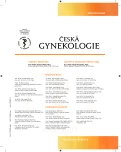Gynaecological surgery of Jehovah´s Witnesses
Authors:
Milan Kudela 1,2
; R. Pilka 1; L. Hansmanová 1
Authors‘ workplace:
Gynekologicko-porodnická klinika LF UP a FN, Olomouc, přednosta prof. MUDr. R. Pilka, Ph. D.
1; Institut zdravotnických studií, Fakulta humanitních studií UTB, Zlín, ředitelka UPA FHS UTB Mgr. L. Reslerová, Ph. D.
2
Published in:
Ceska Gynekol 2013; 78(3): 243-246
Overview
Objective:
To present experience with surgical treatment of various gynaecological diseases in patients belonging to the Church of Jehova´s Witness.
Designe:
Retrospective study.
Setting:
Department of Obstetrics and Gynaecology, Palacky University Olomouc, Institute of Health Care Studies, Faculty of Humanity Studies, Thomas Bata University, Zlín.
Methods and results:
The study included 24 patients belonging to the Church of Jehova´s Witness who reject blood tranfusion. The operations in these patients were performed for malignant as well as nonmalignant gynaecological disorders which could not be treated by conservative therapeutic procedures. The operation records were analysed and evaluated according to a set of criteria including the type of surgical procedure, estimated amount of blood loss, postoperative complications and the outcome of surgical treatment.
Conclusion:
Jehovas´s Witnesses represent a risk group of patients considering their refusal of blood transfusion. The indication for the operation and its performing is responsible decision which always inherits a certain degrese of risk. On the other hand, when adhering to the principles of bloodless surgery, the therapeutic results are very good and in the properly indicated cases the scope of risk is acceptable.
Keywords:
Jehova´s Witness – gynaecological operation – bloodless surgery
Sources
1. Donnez, J., Nisolle, M. CO2 laser laparoscopic surgery. Adhesiolysis, salpingectomy, laser uterine nerve ablation and tubal pregnancy. Baillieres Clin Obstet Gynaecol, 1989, 3(3), p. 525–543.
2. Monk, TG. Preoperative recombinant human erythropoetin in anemic surgical patients. Crit Care, 2004, 8, p. 45–48.
3. Oladapo, OT. Elective abdominal hysterectomy in Nigerian Jehovah´s Witnesses. J Obstet Gynaecol, 2004, 24, p. 690–693.
4. Orji, EO., Sotiloye, D., Fawole, AO., Huyinbo, KI. Jehovah´s Witnesses and blood transfusion revise: a review of the benefits and risks . Niger J Med, 2001, 10(2), p. 55–58.
5. Pafko, P. Rozhovor s prof. MUDr P. Pafkem, DrSc. Mod Gynek Porod, 2009, 18, 4, s. 643–647.
6. Retamales, PA., Cardemil, HG. Benefits from the exercise of autonomy and informed consent: the example of Jehovah´s Witnesses. Rev Med Chil, 2009, 137(10), p. 1388–1394.
7. Shander, A., Hofmann, A., Ozawa, S., et al. Aktivity-based costs of blood transfusions in surgical patients at four hospitals. Transfusion, 2010, 50(4), p. 753–765.
8. Shander, A., Javidroozi, M., Perelman, S., et al. From bloodless surgery to patients blood management. Mt Sinai J Med, 2012, 79(1), p. 56–65.
9. Shiroki, R., Maruvama, T., Kusaka, M., et al. Robot-assisted laparoscopic partial nephrectomy using daVinci S-surgical system for localized renal tumor: report of initial five cases. Nihon Hinyokika Gakkai Zasshi, 2011, 102(5), p. 679–685.
10. Simou, M., Thomakos, N., Zagouri, F., et al. Non-blood medical care in gynecological oncology: a review and update of blood conservation management schemes. World J Surg Oncol, 2011, 9, p. 142.
11. Yorozu, T. Jehovah´s Witness patients. Masui, 2010, 59(9), p. 1149–1152.
12. Záleská, D. Právní podmínky respektování práva na odmítnutí krevní transfuze. Mod Gynek Porod, 2009, 18, 4, s. 648–655.
Labels
Paediatric gynaecology Gynaecology and obstetrics Reproduction medicineArticle was published in
Czech Gynaecology

2013 Issue 3
-
All articles in this issue
- Peripartum cardiomyopathy after caesarean section – a case report
- Endothelial dysfunction in pregnancies with chronic hypertension
- The influence of warmed infusion during C-section on the mother and child – a pilot randomised prospective study
- Gynaecological surgery of Jehovah´s Witnesses
- The incidence of latent asymptomatic celiac disease in women with decreased fertility
- Persistence of the treatment of overactive bladderin Czech Republic
- Radiotherapy in vulvar cancer treatment
- Expression of carbonic anhydrase IX in the breast carcinomas
-
Psychosocial climate in maternity hospitals from the perspective of parturients II.
Predictors of women‘s satisfaction with perinatal care in the Czech Republic - Intrahepatic cholestasis of pregnancy
- Determination of anti-Müllerian hormone in women
- Cervical cancer – possibilities of detection of human papillomavirus
- Antibiotic profylaxis in obstetrics
- Solitary fibrous tumor of endometrium – a case report
- Czech Gynaecology
- Journal archive
- Current issue
- About the journal
Most read in this issue
- Intrahepatic cholestasis of pregnancy
- Determination of anti-Müllerian hormone in women
- Antibiotic profylaxis in obstetrics
- Peripartum cardiomyopathy after caesarean section – a case report
